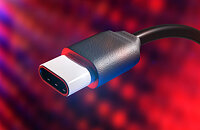Monday, August 10th 2020

Device IDs of Intel's USB 4.0 Host Controller and Strategy to Phase Out Type-A Revealed
Device IDs of Intel's upcoming line of standalone USB 4.0 host controllers leaked to the web, courtesy Hardware Leaks (@_rogame). The controller possibly comes in three variants, bearing device IDs 0x9A1B, 0x9A1D, and 0x9A13. The alleged Intel confidential document screengrab speaks of USB 4.0 and USB 3.2 support (no mention of USB 2.0/1.1), and USB Power Delivery 3.0.
With USB 4.0, the USB-IF (USB Implementers Forum, or the special interest group behind USB), appears to want to standardize the USB type-C connector, eventually phasing out the type-A connector. To that effect, the document leaves out mention of USB 2.0/1.1 backwards compatibility. USB 4.0 debuts with an interface bandwidth of 40 Gbps, or 8 times that of USB 3.0, or over 80 times that of USB 2.0.
Sources:
_rogame (Twitter), GenGoOn (image credit)
With USB 4.0, the USB-IF (USB Implementers Forum, or the special interest group behind USB), appears to want to standardize the USB type-C connector, eventually phasing out the type-A connector. To that effect, the document leaves out mention of USB 2.0/1.1 backwards compatibility. USB 4.0 debuts with an interface bandwidth of 40 Gbps, or 8 times that of USB 3.0, or over 80 times that of USB 2.0.

38 Comments on Device IDs of Intel's USB 4.0 Host Controller and Strategy to Phase Out Type-A Revealed
So on the Intel TB3 controller example (along with many other examples of external USB 3.x chips), the USB 2.0 lines are taken from the southbridge and passed right on through.
Lack of the Serial Port makes it a pain to upgrade.
I say screw them.
That may sound nitpicky, but it's critical: consider the case where you plug a USB 1.1 Type-A device into a USB 3.2 Type-C connector (via a Type-A to Type-C adapter). The data from the device will still be received by whatever controller is at the other end of the connector's cable - if that controller is a USB 3.x controller, it'll say "I dunno what to do with this" and pass the data down the chain to the next controller - which happens to be the USB 2.0/1.1 controller, which does know what to do. So there's a little more latency, but your legacy USB devices are still going to work.
Important to note here is that the USB 2.0/1.1 controller I mentioned is actually just part of the CPU or PCH. There are no discrete USB 1.1 or 2.0 controller chips (except on add-in cards), as these versions of the interface are so well-known, small (in terms of die area) and simple to implement, that every new PC has implementations of these versions baked in. This is unlikely to change within the next decade - if ever.
tl;dr don't worry about your USB 2.0/1.1 devices no longer working in new computers. They will continue to work, probably until the end of time, thanks to Type-A to Type-C adapters.
iMac, MacBooks, iPad, uses Type-C exclusively and Mac Pro has both Type-C and Type-A.
Edit: curious, you can't inline WebP on this forum?
I bought Windows 98 and a Microsoft Natural Keyboard Elite in, uh..., 1998 I guess - and it was my second USB keyboard and by then Plug-and-Pray had finally been refined enough to earn its official moniker. I'm guessing USB was already out for Windows95's official plug-and-play launch hype 25 years ago.
I'm quite pissed off at motherboards still giving these useless connectors (well, technology, not the physical thing). Noone uses that crap for anything.Yep, certain manufacturers are stuck in 1973 or something. There no reason whatsoever for COM being used for anything.